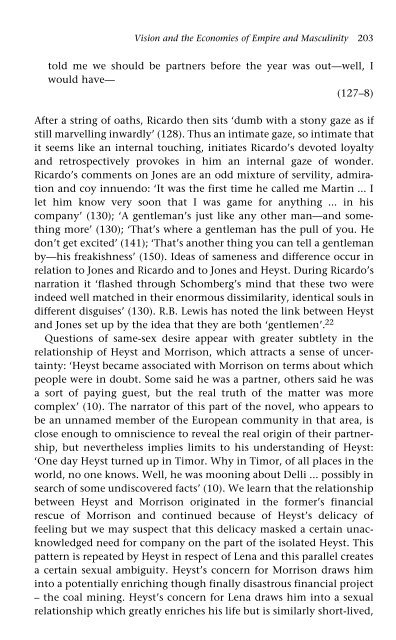Conrad and Masculinity
Conrad and Masculinity
Conrad and Masculinity
You also want an ePaper? Increase the reach of your titles
YUMPU automatically turns print PDFs into web optimized ePapers that Google loves.
Vision <strong>and</strong> the Economies of Empire <strong>and</strong> <strong>Masculinity</strong> 203<br />
told me we should be partners before the year was out—well, I<br />
would have—<br />
(127–8)<br />
After a string of oaths, Ricardo then sits ‘dumb with a stony gaze as if<br />
still marvelling inwardly’ (128). Thus an intimate gaze, so intimate that<br />
it seems like an internal touching, initiates Ricardo’s devoted loyalty<br />
<strong>and</strong> retrospectively provokes in him an internal gaze of wonder.<br />
Ricardo’s comments on Jones are an odd mixture of servility, admiration<br />
<strong>and</strong> coy innuendo: ‘It was the first time he called me Martin ... I<br />
let him know very soon that I was game for anything ... in his<br />
company’ (130); ‘A gentleman’s just like any other man—<strong>and</strong> something<br />
more’ (130); ‘That’s where a gentleman has the pull of you. He<br />
don’t get excited’ (141); ‘That’s another thing you can tell a gentleman<br />
by—his freakishness’ (150). Ideas of sameness <strong>and</strong> difference occur in<br />
relation to Jones <strong>and</strong> Ricardo <strong>and</strong> to Jones <strong>and</strong> Heyst. During Ricardo’s<br />
narration it ‘flashed through Schomberg’s mind that these two were<br />
indeed well matched in their enormous dissimilarity, identical souls in<br />
different disguises’ (130). R.B. Lewis has noted the link between Heyst<br />
<strong>and</strong> Jones set up by the idea that they are both ‘gentlemen’. 22<br />
Questions of same-sex desire appear with greater subtlety in the<br />
relationship of Heyst <strong>and</strong> Morrison, which attracts a sense of uncertainty:<br />
‘Heyst became associated with Morrison on terms about which<br />
people were in doubt. Some said he was a partner, others said he was<br />
a sort of paying guest, but the real truth of the matter was more<br />
complex’ (10). The narrator of this part of the novel, who appears to<br />
be an unnamed member of the European community in that area, is<br />
close enough to omniscience to reveal the real origin of their partnership,<br />
but nevertheless implies limits to his underst<strong>and</strong>ing of Heyst:<br />
‘One day Heyst turned up in Timor. Why in Timor, of all places in the<br />
world, no one knows. Well, he was mooning about Delli ... possibly in<br />
search of some undiscovered facts’ (10). We learn that the relationship<br />
between Heyst <strong>and</strong> Morrison originated in the former’s financial<br />
rescue of Morrison <strong>and</strong> continued because of Heyst’s delicacy of<br />
feeling but we may suspect that this delicacy masked a certain unacknowledged<br />
need for company on the part of the isolated Heyst. This<br />
pattern is repeated by Heyst in respect of Lena <strong>and</strong> this parallel creates<br />
a certain sexual ambiguity. Heyst’s concern for Morrison draws him<br />
into a potentially enriching though finally disastrous financial project<br />
– the coal mining. Heyst’s concern for Lena draws him into a sexual<br />
relationship which greatly enriches his life but is similarly short-lived,




